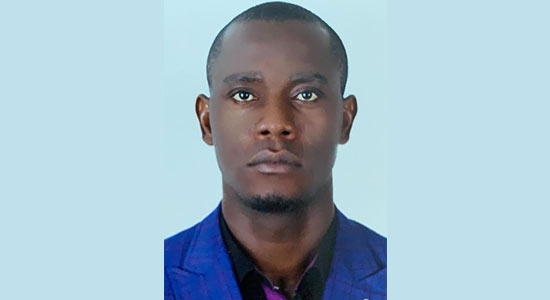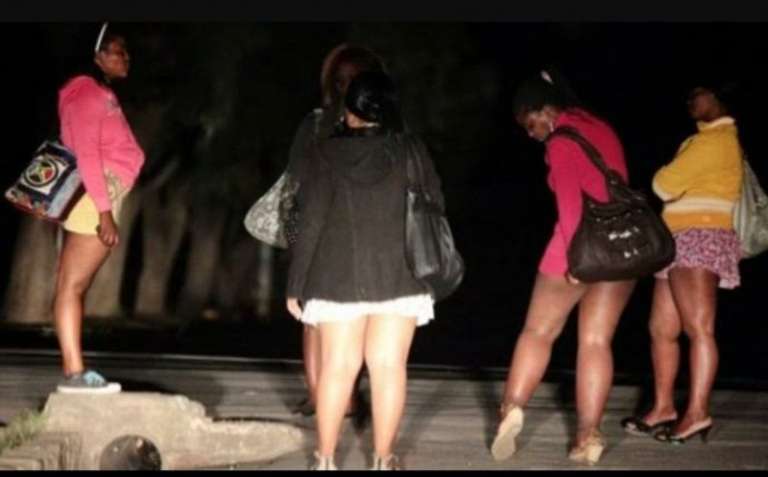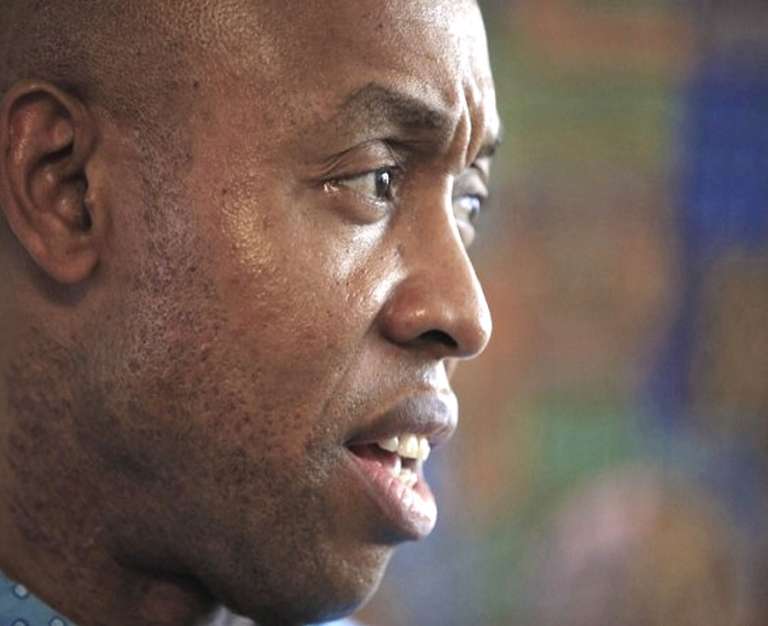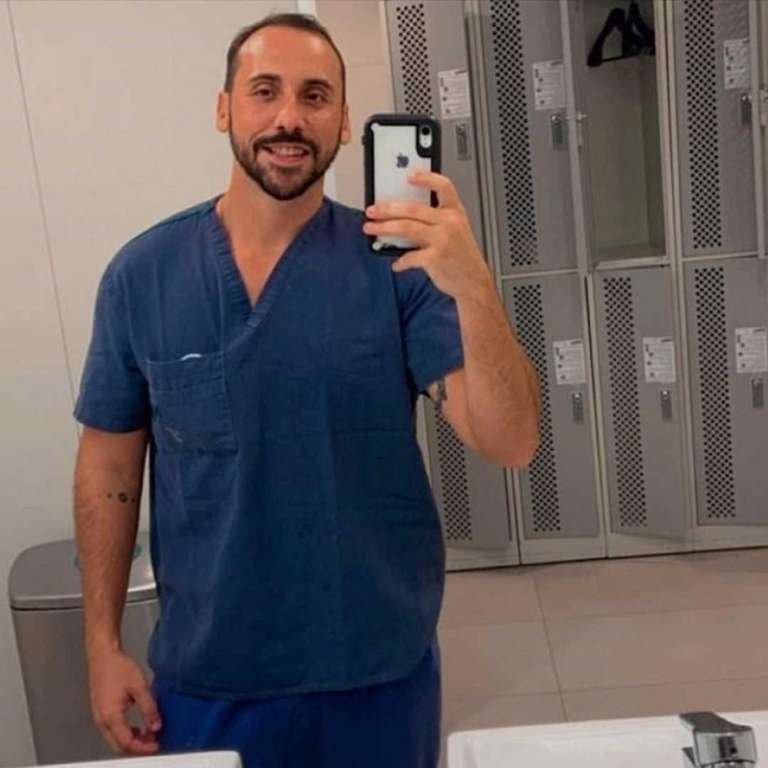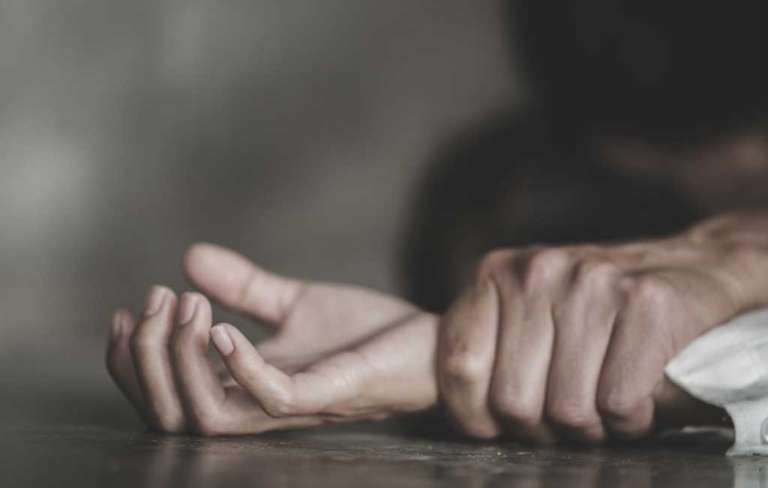CHUKS ILOEGBUNAM offers an insider’s view of how Gov Peter Obi works and what values drove his actions as Governor. It’s the Governor’s birthday today 19 July.
Until the run up to the 2003 general elections, I was unaware of Peter Obi’s existence. Our first meeting was in Asaba late in 2002, when Dim Chukwuemeka Odumegwu-Ojukwu led an APGA delegation on a campaign trip to Delta State. I had travelled from Lagos to Asaba, to assist Prince Ned Nwoko, a friend from my London days, who was the APGA gubernatorial candidate for Delta State.
An excerpt from The Promise of a New Era, a book by Chuks Iloegbunam, out in August 2022.
Former Biafran Commando Colonel Joe “Air Raid” Achuzia led the Delta APGA reception team. With Ned exchanging pleasantries with some party supporters under a tree on the far side, I joined a handful of others who listened as Chief Achuzia stood by his car and delivered an impromptu lecture. This was happening on the grounds of the Grand Hotel, and while we waited for General Ojukwu’s team to arrive. Achuzia spoke on the need for everyone to always be on the alert for his or her safety. “If I got found today wielding an automatic rifle,” he said, “that would be trifling. I’ve gone past that age. But any of you young ones here with a job and salary for six consecutive months without acquiring an AK47 is foolish.”
Looking back now, I wonder whether Achuzia spoke in that vein because he had foreseen the calamitous security situation that has now drowned Nigeria. Anyway, Ojukwu’s convoy soon swept into the Grand Hotel. With the visitors from Anambra State, we formed a sizable crowd that soon plunged into a brightly lit hall.
With everyone seated and introductions concluded, Chief Ojukwu spoke on why APGA had become the “in thing, the party to belong to.” Deltans, he said, should elect Ned Nwoko their next Governor. Ned took his turn at the microphone, and thanked the party for reposing confidence in him by giving him its gubernatorial ticket. He described his electoral chances as bright and asked for everyone’s support. Peter Obi, the APGA governorship candidate for Anambra State, also spoke. He disdained the way politicians were carrying on and promised that, if he emerged victorious in the Anambra ballot, he would give his home state a new lease of life. “Is Anambra cursed, or are we the cause?” he asked. It was his slogan.
After the speeches, handshakes, backslapping and snacks, I seized a good moment to approach Peter Obi, asking where he could be reached for an interview.
“Onitsha!”
Fighting for a Mandate
Inever saw him again until months after the governorship ballot. I played no role whatsoever in his campaigns. But when INEC declared Dr. Chris Nwabueze Ngige of the People’s Democratic Party (PDP), the elected Governor of Anambra State, I became involved. The Ngige verdict raised a furore across the Igbo country. People were incredulous. Peter Obi headed for the Election Tribunal. I travelled East and interrogated the people’s misgivings. I returned to Lagos convinced that Mr. Obi had indeed won the election, only for his mandate to be stolen.
Indignant, I plunged into the fray, writing nearly fifty articles on the topic over the three years it took for the courts to restore Peter Obi’s electoral mandate. People approached me then from all over, pleading that I “die the matter,” because Dr. Ngige was, after all, my brother. “Both of you are from Idemili North Local Government Area, and his hometown of Alor shares a common boundary with Abatete, your hometown.” I didn’t want to know. Job offers and the promises of a glorious payday were thrown around but I remained steadfast with my pro-Peter Obi opinions in my Perspectives column in the Vanguard. All appeals for me to ditch my conviction amounted to hitting on a deer’s horns. My position was the same as I took in the matter of Chief M. K. O Abiola, whose June 12 1993 mandate was criminally nullified. As far as I was concerned, if someone won a properly contested election, his victory had to be upheld.
Thanks to Uncle Sam Amuka, the Chairman of Vanguard newspapers. And thanks also to Mr. Gbenga Adefaye, the newspaper’s editor. Not once did they impede the use of my weekly column for the advancement of Mr. Obi’s cause. After about three months of my continual articles on the Anambra election, Peter Obi invited me for a meeting. Only after Obi had become Governor did I learn the impetus for the invitation. Damian, Peter’s immediate elder brother, revealed that he was the one who advised his brother to meet with “this Chuks who, week in and week out, was championing our cause in the Vanguard.”

The Enlistment
Idrove over to Peter’s office on Aerodrome Road in Apapa. The very large warehouse in the compound surprised me. How could this young man own this? I wondered. Our brief meeting marked my official enlistment in a cause I had been fighting on my own volition. I discovered that, like me, Peter lived in Festac Town. We discussed media strategy. From then and until he became Anambra’s Governor, we met regularly. Unless he or I was out of the country, or out of Lagos, we met practically every week. Otherwise, we chatted on the phone, discussing the progress of his case through the Election Tribunal and the Appeal Court, using such discussions to plot fresh manoeuvres for electoral justice.
I found myself touring media houses around Lagos, contacting editors, and features editors, and reporters, positing our points of view, writing rejoinders and rebuttals to stories coming out of our opponent’s camp.
At around noon on March 14, 2006, I was at home taking things easy when my phone rang. It was Peter Obi.
“Have you heard the news?” he asked.
“What’s the news?”
“We have won!” Before I could say “Congrats,” he continued: “Prepare to fly to Enugu tomorrow. Chief John Nnia Nwodo is waiting for you. You both are to write my inaugural address.” In Enugu the following day, Chief Nwodo and I sat in the study of his GRA Enugu home and pounded out a draft of Mr. Obi’s inaugural address. Meantime, Peter Obi, Emeka Etiaba, who since became an SAN, and Chief Victor Umeh, the APGA chairman, flew to Abuja to collect Mr. Obi’s INEC Certificate of Return. With all of us in Enugu on March 16, we put heads together and agreed the final text of the inaugural address.
March 17, St. Patrick’s Day, was inauguration day. From Enugu, we left early in the morning for Awka in a convoy of just three vehicles, with neither siren nor outriders. Peter Obi and I were in an SUV. The driver introduced himself as the Anambra Government House Chief Driver. As we approached Awka, I noticed that Peter was looking for something around the car’s panels. Not finding it, he asked the driver the button to wind down the window, saying it would be impolite for crowds to wave without his acknowledging their cheers.
All about cars
Sir, the windows are designed to be permanently shut. The vehicle is bullet-proof.” That week, we got a request from Ngige’s people asking to have the SUV and about four others back, they being the personal properties of Dr. Ngige. A cacophony of angry voices rose from all corners, saying the matter was unworthy even of discussion. If Governor Peter Obi had so desired, he could have kept the vehicles without the heavens crashing on any pates. Instead, he turned the matter over to Onyechi Ikpeazu SAN, who had successfully argued his governorship case. Dr. Ikpeazu studied all the papers and ruled that the vehicles rightly belonged to Ngige. They were turned over to Dr. Ngige who is alive and well, and who, without hesitation will confirm the veracity of this story.
There were a few Peugeot cars around. And those were the vehicles we started with. It made no difference to Peter because that was the brand of cars he had always used. But new vehicles had to be purchased. Commissioners would be appointed. And Permanent Secretaries and other senior officials too! None of them would be expected to be going about by “footwagen.” Governor Obi asked for quotes on the cost of Peugeot 406 cars from agents and from the Peugeot Automobile Nigeria (PAN) Limited in Kaduna. He ruled all submitted invoices outrageously high, especially as we were going to buy vehicles by the scores.
Closing from work one evening, Governor Obi mentioned that the French bosses at PAN would be in our office the following morning. He had invited them to a haggling match. “There is no reason I won’t yank a third off the price of each car we will be buying.” I grinned at his optimism. The men arrived as scheduled. In those early days, there were, apart from Mr. Uche Udedibia, the Permanent Secretary at Government House, and a handful of Civil Servants and members of our security detail, just four of us in the Governor’s Office. These were myself, the Chief Press Secretary, Mr. Mike Udah (Ojinnaka), Mr. Emeka Odumegwu-Ojukwu Jnr., and Chief (Mrs.) Uju Okeke, a retired Civil Servant and APGA leader who was fondly called Mkpulunma because of her beauty. Her son and Peter Obi were mates at Nsukka. Valentine Obienyem soon joined us.
We played no role in the haggling, which lasted all morning, with the Governor engaging three white men. At some point, Emeka Jnr was asked into the conversation – but only as an interpreter, because he was perfectly bilingual in English and French. He went in when the Governor sensed that the fire of his pitch was being tamed by linguistic inexactitudes.
By the time the match ended, I couldn’t swear that the PAN trio represented the happiest salesmen in the world. But Peter was beaming. “I told you I would do it.” At what cost? “They had me sign an undertaking that no other Governor would hear of the deal, lest they invade Kaduna asking for similar concessions.”
A master in frugality
All through the years we fought to reclaim his mandate, I hadn’t any inkling that Mr. Obi was a past master in frugality. The Peugeot deal opened my eyes. More was to come. Not being an old capital, Anambra had neither guesthouses nor enough living quarters for public officials. Some of us stayed in hotels for many months. When, one day, I told the Governor how much it would cost for us to move into Parktonia Hotel, which appeared more conducive, he said it couldn’t be true. He accompanied us to the place and out came his calculator. For many minutes he and the hotel’s manager kept hitting at the keys of their calculators. At a point, Peter asked for the hotel’s owner. Told that the man was away, Peter retorted that he obviously owned a cell phone. In the end the cost of our stay at Parktonia was cut by nearly a half.
Even on the international scene, his frugal disposition was always there, more acute, really, since expenditures abroad were mostly dollar denominated. I remember when we attended the World Igbo Congress convention in Detroit, Michigan, in 2007. It was an important convention with the theme of Repositioning the Igbo Nation, and all South East Governors were to attend. I wasn’t in the Anambra delegation; Mr. Obi was always averse to outsized delegations. But I was in the US on vacation at the time. Governor Obi, Chief Victor Umeh, the APGA Chairman, and Valentine Obienyem arrived with a morning flight the day the event started. Whenever schedules allowed it, Governor Obi would get into a country in the morning, conduct his business quickly and leave by evening flight, thereby avoiding the expenses an overnight stay would incur. I received the Governor’s team at the lobby of the hotel where the meeting held. The opening ceremony was seven hours away. Governor Obi said he was not prepared to take a suite in the hotel when he won’t spend a night on American soil. But Chief Umeh argued that the sight of a State Governor sitting out hours in a hotel lobby would be unfortunate. Obi didn’t take a suite. Fortunately, he didn’t have to spend hours hanging around a hotel lobby!
Corruption and the banks
Sometimes, Obi’s fastidious predilection to money matters score really big. We were in the office one day at around 9pm. The Civil Servants had long gone home. Only the security men and a few protocol officers and drivers remained. I was in my office with an eye on the window, to know exactly when the Governor called it a day. Instead he phoned me to come. I quickly strode across to his office. He was seated behind his desk a document in hand. Standing there, I waited for instructions. He waved me to a seat.
“A banker is going to lose his job tonight,” he said. He handed me a document. It was a statement on funds wired into one of Anambra’s bank accounts. As I handed it back, he showed me a second document. He soon eased my raised eyebrows. A bank manager in Awka had an hour earlier presented to him the balance of Anambra’s account in his bank. Obi was sure that the amount shown to him was incorrect. He, therefore, asked the banker to return to his office and do a recheck of his books.
The Governor and I engaged in small talk while we waited for the banker’s return. The Governor’s ADC soon ushered him into our presence. He was decked out in a dark suit and striped tie.
“Your Excellency, the original amount I submitted is correct.” He placed a sheaf of computer printouts on the Governor’s desk. Without casting a glance at the paperwork, the Governor reached for a drawer and pulled one of the documents he had earlier shown to me. He handed it to the man.
“How come your papers have no entry on this payment?” The banker swallowed hard. “And this too.” He handed over the second document. The air conditioner was on. But the banker started to sweat profusely. I expected the Governor to start railing at him. Instead, he gently told the man to leave. As he trudged the short distance to the exit, the Governor delivered a one-liner: “I will shortly be in conversation with your Chairman and MD.”
With this story in view, consider the debacle in Abuja where, under the watch of a confirmed epitome of financial prudence, Ahmed Idris, the Accountant General of the Federation, made away with the gargantuan sum of N80 billion. If N80 billion is too hefty for people’s psyche to easily handle, they could recall only the N2 billion of Federal pensions fund plundered by Abdulrasheed Maina. It is because of the thieving spree promoted by derelict leadership that kleptocratic vultures are antipathetic to the idea of Peter Obi directing the affairs of this country. For, under his watch, the very fear of assorted nemeses would never allow even the most seasoned of financial bandits to tamper with state funds.
Look again at the story of the middle-ranking banker that tried to rid Anambra State of a cool N100 million. He forgot that Peter Obi became Governor straight from being a bank chairman. He didn’t know that ever before Mr. Obi sends someone on an errand, he would have looked at all sides of the assignment from multiple angles and various sources. There is no doubt whatsoever that local bank officials, invariably in collusion with bosses at headquarters, routinely fleece countless states. And because every government in the country has multiple accounts in numerous banks, fraudsters and freeloaders have field days diverting state funds in the direction of their greedy pockets. But no one tried such nonsense with Peter Obi.
Like fable of the sour grapes
It was because Peter Obi is proficient in money management that he saved up billions in investments and raw cash that he handed over to the government that succeeded his. It was his frugality that made his government about the only one in Nigeria that never borrowed a dime. I often heard him say that, “Money is meant to be saved, not to be spent,” a clear commentary on financial thriftiness. In reality, what he practiced in government, and what he practices in his business affairs, is to scrupulously save money and to spend it only when it was absolutely necessary. Unlike Peter Obi, many heads of government don’t even bother to scrutinise bank returns presented for their signatures. But eagle-eyed Peter Obi examines everything with a fine toothcomb. He does so as a matter of course. He does so with regularity.
It is because everything is fair in Nigerian politics that people reeling in ignorance and those playing plain dirty accuse Peter Obi of achieving nothing while in government. We already mentioned that his government never indebted Anambra State. We also added that he left billions for the government he handed power over to. Yet, he that was tagged stingy achieved so much as Governor that most of his gubernatorial contemporaries can only turn green with envy. A different chapter takes a comprehensive look at his achievements in government. Suffice it to mention here a few of them, taken from the fields of Education and Health.

Return of Schools
One evening, a protocol officer came and announced that the Governor required my attention. I picked up pen and paper and went to answer the summons. At the entrance to the Executive Chambers, I saw the Governor and two visitors emerging from his office. So, I waited for them to reach me. Right there he thrust a piece of paper in my hand. “Go and write a press release on these schools we are returning to their original owners.” I glanced at the paper. It contained something between twenty-five and thirty secondary schools, all to be returned to the missionaries. Unguardedly, I remarked that it didn’t contain the names of privately owned schools that also came under the hammer of government takeovers.
“Uncle Chuks. Go and do as I’ve instructed!” It was a rebuke.
“Of course, Your Excellency.”
Less than twenty minutes later, I returned with my draft. He read and approved it. As I wheeled around to go call in the Chief Press Secretary and the Government House media crew, he said I should not release the statement yet. My spirit crumbled. I thought that, perhaps, in the little time it took to write the statement, people opposed to the return of schools to their original owners had thrown a spanner in the works. It was always a most contentious issue, right from 1970 when the Administration of the defunct East Central State headed by Mr. Tony Ukpabi Asika took over all the schools built and previously managed by the churches, communities and private educationists. But no one had had the courage to cancel the ill-conceived action.
It turned out that no one was playing the spoiler. Only that the Governor thought it would be improper for the heads of the two main denominations to first hear the news via the media. Therefore, he directed that I should go brief Archbishop Maxwell Anikwenwa of the Anglican Communion, and Bishop Simon Akwali Okafor of the Catholic Church on the development. After that, the press should be brought into the picture. Okechukwu Okeke, my driver, drove me and Ubaka Nkwoka (Mmagha), my personal assistant, the short distance to Archbishop Anikwenwa’s court off the Aromma Junction. From there we crossed the Enugu-Onitsha expressway and drove into the other half of Awka where Bishop Okafor’s residence sat on the grounds of the old St. Patrick’s Cathedral. Both prelates were overjoyed.
Thereafter, we shared the statement to the media, asking that it should be in the news the next morning. However, when I got home later that night, a neighbour enthusiastically welcomed me with the story that a special radio announcement had mentioned that Governor Obi had returned to their owners all the schools government took from them more than three decades earlier.
My neighbour was right, but not completely so. The first announcement was of secondary schools. It took place in January 2009. Nearly three years later, on November 22, 2011, Governor Obi announced at a formal ceremony in Awka, the return of 1,040 primary schools back to their original owners, and gave them N6 billion to maintain the schools.
Said Governor Obi: “The collapse of education in Anambra State is directly connected to the takeover of schools owned by the missionaries, churches and voluntary organisations in 1970. That singular exercise signalled the disappearance of morality and the building of character from our school system. This can no longer be allowed. Any society that deliberately allows its educational institutions to fall into stupor has already arranged the burial ceremony of the leaders of tomorrow. A progressive leader who sees danger for his people must take serious, radical actions, even if they are unpopular, in order to bring renewal and re-birth…We are not abandoning these schools, in the name of handing them over, because the State Government will continue to pay the salaries of all their academic and non-academic staff; while the Missions will be in charge of the day-to-day running and general administration of the schools.”
Dr. Valerian Okeke, the Catholic Archbishop on Onitsha, speaking on behalf of the missionaries, addressed the Governor thus: ”You have written your name in gold and you have wiped the tears of our people. You have rectified the anomalies of the civil war and rectified the fault of past leaders. With this action the church has forgiven them for forcefully taking our schools.”

Reaping the dividends
The Obi administration procured and distributed over 30,000 computers to secondary schools, 22,500 of them from Hewlett-Packard (HP). It was the first administration in Nigeria to achieve such a feat which Mr. Fabrice Campoy, the Managing Director for Personal Systems Group HP Inc, described as the biggest of such projects in Africa and the Middle East.
In addition, the Anambra State Government provided Microsoft Academies to more than 500 secondary schools. Mr. Ken Span, the Head of Microsoft in Nigeria described it as the biggest such deployment in Africa. All the secondary schools that got the Microsoft Academies were also provided with Internet connectivity. Mr. Gerald Ilukwe, the CEO of Galaxy Backbone characterized it as incomparable to any in the annals of Internet connectivity in the country.
It did not take time for Peter Obi’s innovative interventions in Anambra’s education sector to start yielding positive results. In three years Anambra jumped from the 24th position to the 1st of the nation’s 36 States in results of the National Examination Council (NECO), and the West African Examination Council (WAEC). Little wonder that Anambra State has about the highest cutoff marks for common entrance examinations into secondary and tertiary institutions.

Health & Wellness
The results in the Health Sector under Governor Peter Obi are equally spectacular. His government conceived and built the Chukwuemeka Odumegwu-Ojukwu University Teaching Hospital in Awka. His Government also built a medical centre where heart operations are now routinely performed. The idea of the heart centre grew out of a chance meeting between Mr. Obi and Dr. Joseph Nwilo, a celebrated Anambra-born cardiac surgeon based in the United States. Obi asked the doctor to relocate to Nigeria to continue his life-saving operations. Dr. Nwilo said he would gladly oblige on the condition of a well-equipped hospital. The cost of setting up the facility was computed. It came to N1 billion. Governor Obi instantly disbursed the fund. On August 3, 2014, months after Mr. Obi had completed his second tenure and left office, the first open-heart surgery was performed at the Joe Nwilo Heart Centre at the St. Joseph’s Hospital, Adazi Nnukwu, Anambra State. The record-setting feat was performed by Dr. Nwilo and a team of 14 doctors.
While Peter Obi had the foresight to establish a centre for heart surgeries, one of his fellow presidential contestants, said to be the best black phenomenon since the abolition of the slave trade, used up the thirty-one days of a whole month in a London hospital, fixing a dislocated knee.
Mr. Obi’s government won the $1 million Bill and Melinda Gates Foundation Prize as the best-performing state in Immunisation in the South East geopolitical zone. The government added to the prize money to build, in partnership with the churches, ten Maternal and Child Care Centres across the State, especially in the rural communities.
Ethics and good governance
There are other aspects of his administration that marked Peter Obi out as exceptional, patriotic and visionary. He had absolutely no truck with nepotism. Through the five years I served in his administration, not one person from his own Anaocha Local Government Area was appointed a Commissioner. He felt it would be unfair to the other twenty local government areas. His governorship was enough slot for his LGA. Compare this to some other leaders whose appointments are based on cronyism, biological affinity or religious considerations.
I remember that shortly after he assumed the governorship, pressure started piling for him to tar one of the roads that ran through Agulu, his hometown. Obi refused, insisting that road construction had to be based on need, not on where a Governor or a powerful politician came from. Dame Virgy Etiaba (Mama Anambra) later awarded the contract for the construction of the road in question when she became Governor. This happened when Obi stood unjustly impeached by the PDP-controlled State House of Assembly. Mama Anambra is alive and well to confirm this story.

His records speak for him
Everything written here is verifiable, as is the fact that Peter Obi spent the normal four years at the University of Nigeria, Nsukka, to earn a Bachelor’s degree in Philosophy. He entered Nsukka in 1980, the same day Mike Udah, who became his Chief Press Secretary, did. They both graduated the same day in 1984, with Peter earning a Second Class Lower degree. All the talk about Peter using up 12 years to earn a first degree is bunkum. Nsukka University records have not been deleted. Peter’s academic records are easily verifiable, unlike those of some other presidential candidates of unknown schools and unregistered certificates.
Since December 2020 when Peter Obi and I met in Ajalli at the funeral of Dr. Arthur Nwankwo, the Chairman of Fourth Dimension Publishing Company in Ajalli, we haven’t seen again. Our last communication took place on May 18, 2021, when he texted me from London to wish me a “Happy Birthday.” I replied him with a “Thank you, very kindly.” Since the political warm-up started for the 2023 general elections, I have keenly followed his progress and those of other politicians. Still, I saw no reason to contact Peter. I didn’t tell him that I was writing this book. I didn’t owe him that information. I simply saw my duty only in terms of telling the truth of my personal experience of his political leadership and, thereafter, dare anyone with a contrary opinion to controvert my thesis.
Few people know Peter Obi and his work ethics more than I do. That is why I can with authority say that the avalanche of lies being bandied about regarding him is to do with the desperation of drowning politicians futilely clutching at straws. They shamelessly lied through the teeth who have accused Governor Obi of being anti-Muslim and anti-North. What I know is that during Islamic festivals he always feted Muslims, leaders and non-leaders alike, either at Government House, Awka, or inside the Government Lodge, in Amawbia. Not even Peter Obi himself will deny that we annually sent cattle by the lorry load to Abuja, for officials at the Anambra Liaison office in the Federal capital to distribute to assorted political leaders.
Peter Obi served as Governor of Anambra State for eight years during which period he never went on vacation for a single day. During his tenure, there hardly was a time when stayed abroad for more than one week. Before he handed over power to his successor, he did not load to his convenience such outlandish pensions and gratuities as many a governor found irresistible. He didn’t ask for and was not given a house or houses by the state. He didn’t ask for and was not given a car or cars by the state. He didn’t factor into Anambra’s governance any contractual agreements to his benefit whatsoever, let alone the sort seen in many other states that have left them hemorrhaging.

Why he’s in politics
The truth about Peter Obi is that he is into politics with a consuming zeal to serve the people. Apart from when he was not in Awka, he mostly reported for work at 7 am everyday, and never closed until nightfall. It was, of course, a burden. One morning during our first months, I entered the Governor’s office and found him lying on a couch. Startled, I asked what the matter was. He thought it was an attack of malaria. Asked if I should fetch Dr. Ezenwa of the Government House Clinic, he demurred. At that moment, Damian, his elder brother, who was on his way to Enugu stepped in. He was sure the Governor’s problem was overwork. As I saw him to his car, he said, “Your friend listens to you. Please advise him to slow down.” Quickly back again inside his office, I found the Governor Obi at his desk – working!
“Sir, why are you back at your desk working?” I asked.
“I didn’t come here to fall sick” he replied. We didn’t leave the office that day until well past 7pm.
Because of his sterling achievements, adversaries have been mushrooming even from the woodworks, spewing lies and many more lies, all aimed at assassinating his character and rendering his presidential bid a nullity. How woefully the detractors are failing! People of this country, across all the states, through ethnic barriers, religious divides and conspiratorial animosities have stood out resolutely for him. For one reason. They want the country to take a decisive turn for the better. They want the country to turn its back to the ruinous politics that, to this moment, has held the country in the throes of grinding poverty, endless bloody conflicts, empty stomachs, leaking pockets and utter hopelessness.
The Nigerian peoples have examined Peter Obi and have also examined the others busily digging above their limits and purporting to be aiming for the highest office in the land. They have found that Obi is the way to go. Not because his initials are P. O., but because he represents a breath of fresh air in comparison to the malodorous stench of the capricious lot that have carpeted a country once bound for glory. The Nigerian peoples have taken to heart the admonition of Marcus Aurelius, who was the Roman Emperor from 169 to 180 AD. In his book, Meditations, is to be found countless arresting gems of quotable quotes. For instance, Emperor Marcus had this to say on the evil conspiracies to destroy genuine servants of the people: “When a bunch of known corrupt people unites against one man and spares no attempt to assassinate his character, blindly follow that ONE man.”
The Nigerian people have wisely decided to follow Peter Obi. Without question, Obi’s traducers belong largely in the category that cannot show their certificates, that are incapable of pointing out their ancestral homes, that frittered away the peoples’ commonwealth, that, with effrontery and impunity, pissed on all the citizens’ heads on the pretext that it was raining. That is why they decided to go with him. The people are insisting that the days are now in the past when they could be hoodwinked with the inanity that a receipt acknowledging the payment of electricity tariffs, or the label on a loaf designating its baker was enough certification for educational qualification. The people have decided the intolerability of ailing, nonagenarian leaders that would, every two minutes, be stretchered into air ambulances for medical tours of American and European capitals.
The tremendous thing about the positive developments of this New Era is that it is youth led. The youths are sick and tired of the interminable strikes by university teachers. They are fed up to the hairline with the incessant bloodbaths in places of worship, in villages, in townships, on farmlands. Their acclamation for Peter Obi rebukes a bedraggled leadership coterie of insensate hoodlums that is suffering from a crippling paralysis of the will to take remedial actions against vicious and incessant terrorist attacks that have rendered Nigeria about the most dangerous place to live in the whole wide world.
In every clime under the sun, the tired take a rest. Even God Himself rested on the seventh day of His run of creations, according to Genesis 2:2. But Nigeria is suffocating from the wiles of exhausted and panting Methuselahs who deserve a place by the fireside singing lullabies to their great grandchildren, but who insist on participating in political marathons they lack both the steam and the fuel to feature in. This impunity is precisely what has stoked Nigerian youths into open revolt. Happily their armament, for all its lethality, is solely the Permanent Voters Card. They have taken to heart the pronouncement of Chief Obafemi Awolowo, the sage, who famously prophesied that “A day will come when Nigerian masses from the North and South, Christians and Muslims and Animists will merge as a force for progress and unity, and kick against rigging, corruption and tyranny.”

Celebrating the youth
The Nigerian youths are to be celebrated. They are this country’s division of the global moral army that the American actor Harrison Ford spoke about when he addressed the United Nations Climate Action Summit in New York on September 23, 2019. Said Mr. Ford:
There is a new force of nature at hand, stirring all over the world. They are the young people, whom frankly, we have failed, who are angry, who are organised, who are capable of making a difference. They are a moral army. And the most important thing that we can do for them is to get the hell out of their way.
Nigerian youths have rejected the politics of the retrograde class, together with their avarice, mendacity and equivocations. They have abjured carrots thrown at them in the form of job offers as “Internet consultants.” That would have conscripted them into the ragtag army of social media marionettes fitted with cell phones and inexhaustible data, to sustain a campaign of calumny and perfidy against Peter Obi. They have called the bluff of faceless marauders in cyberspace, who have been employing false aliases, to impugn Peter Obi’s integrity. Nigerian youths are not asking for remuneration. They are not asking for bags of rice and cartons of “agbado”. They are no longer interested in their future being mortgaged. They would have nothing more to do with bloodsuckers that shamefacedly denied the massacre of young blood at the Lekki Tollgate. They want new. They want sparkling. They want whole. They yearn for a New Era. They shall vanquish.
This, then, is the score. For the rationale, the purpose of elections is to put in office the competent. From every available empirical evidence, Peter Obi trumps the tired and recycled candidates of the old order in this Department of Competence. Whoever does not vote for him in 2023, will no doubt have his or her reason. But it will be nothing to do with the imperative of competence. This is my testament. I stand resolutely on it.
ABOUT THE AUTHOR

CHUKS ILOEGBUNAN was Governor Peter Obi’s first Chief of Staff. He is a renowned critic, polemicist and author of many books, including IRONSI: NIGERIA, THE ARMY, POWER AND POLITICS.


